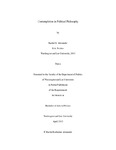Contemplation in Political Philosophy (thesis)

View/
Author
Alexander, Rachel Katherine
Subject
Washington and Lee University -- Honors in Politics
Political science -- Philosophy
Contemplation
Civilization, Modern -- Philosophy
Metadata
Show full item recordDescription
Thesis; [ACCESS TO FULL-TEXT IS RESTRICTED. REQUESTS WILL BE SUBMITTED TO THE AUTHOR.] Rachel Katherine Alexander is a member of the Class of 2013 of Washington and Lee University. From yoga and physical fitness to meditation and prayer, from elementary classrooms to neuroscience, contemplation is everywhere. Is there space for contemplation in political philosophy? Philosophy connotes logic.1 Socrates comes to mind, engaging in rational discourse to reach knowledge, truth, and reality. Contemplation, silent perception of reality and intuition, may then seem at odds with political philosophy. But if we visit our ancestors, the great Greek and medieval thinkers, it becomes clear that rational thought is only half of the process of knowing. They distinguished two modes of knowledge, the ratio and the intellectus. While the ratio encompasses the rational, logical, discursive mode of thought, the intellectus encompasses the contemplative, receptive, non-discursive mode of thought. So
philosophy, almost habitually reduced to logic and ratiocination, includes intellectus if it is to properly seek knowledge and truth. This was true of the founders of political philosophy even if no longer true for us. Contemplation and political philosophy belong together; we cannot have one without the other if we are to fully engage and appreciate the mind. Rachel K. Alexander